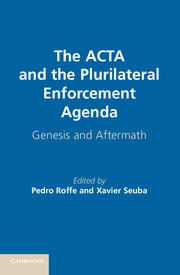Book contents
- Frontmatter
- Contents
- List of Contributors
- Foreword
- Acknowledgments
- Acronyms
- Introduction
- PART I THE FINAL ACT: ITS MAIN FEATURES AND CONTENTS
- PART II DOMESTIC LEGISLATIVE CHALLENGES
- PART III IMPACT ON RELATED PROCESSES
- PART IV VIEWS FROM STAKEHOLDERS: LESSONS
- PART V WHAT LIES AHEAD ACTA
- 21 Assessing the Implications of ACTA for the European Union
- 22 ACTA
- 23 What Was Left Out of ACTA
- 24 Slaying the ACTA Myths
- 25 Developing Countries and the Contestation of ACTA at the TRIPS Council
- 26 ACTA: What Lessons for Future Plurilateral Trade Agreements?
- Annex I Anti-Counterfeiting Trade Agreement
- References
- Index
- References
23 - What Was Left Out of ACTA
Published online by Cambridge University Press: 05 December 2014
- Frontmatter
- Contents
- List of Contributors
- Foreword
- Acknowledgments
- Acronyms
- Introduction
- PART I THE FINAL ACT: ITS MAIN FEATURES AND CONTENTS
- PART II DOMESTIC LEGISLATIVE CHALLENGES
- PART III IMPACT ON RELATED PROCESSES
- PART IV VIEWS FROM STAKEHOLDERS: LESSONS
- PART V WHAT LIES AHEAD ACTA
- 21 Assessing the Implications of ACTA for the European Union
- 22 ACTA
- 23 What Was Left Out of ACTA
- 24 Slaying the ACTA Myths
- 25 Developing Countries and the Contestation of ACTA at the TRIPS Council
- 26 ACTA: What Lessons for Future Plurilateral Trade Agreements?
- Annex I Anti-Counterfeiting Trade Agreement
- References
- Index
- References
Summary
Introduction
ACTA is a fascinating and in places disturbing document. But it is worthy of attention not only for what is there on the page, but for what is not there. I hope to convince you that we all – governments, trade negotiators, right holders, civil society and user interests – have as much to learn from the absences in ACTA as from its black-and-white text.
From Ambition to Vague Aspirational Statements and Optional Extras
The ACTA negotiations started out with high, evangelical ambitions: to promote IP enforcement through global cooperation and to establish the “gold standard” for IP enforcement rules and procedures. Early leaked texts showed how major players like the United States and the European Union aspired to export their own detailed, right holder–friendly systems.
The United States wanted its digital copyright regulations: comprehensive rules against “hacking” technological protections like encryption and copy controls, and safe harbours for Internet intermediaries conditioned on those intermediaries becoming Internet police, removing infringements and kicking the intransigent off the Internet entirely. The United States also wanted extensive rules criminalising even non-commercial copyright infringements – based on its own No Electronic Theft Act of 1999.
The EU wanted extensive measures for intercepting IP infringement at the border, including requirements to stop infringing goods “in transit,” as well as at the point of import or export, and the extension of these measures and other enforcement measures to patents, designs, and the EU’s own favoured form of IP protection: geographical indications.
- Type
- Chapter
- Information
- The ACTA and the Plurilateral Enforcement AgendaGenesis and Aftermath, pp. 338 - 344Publisher: Cambridge University PressPrint publication year: 2014



